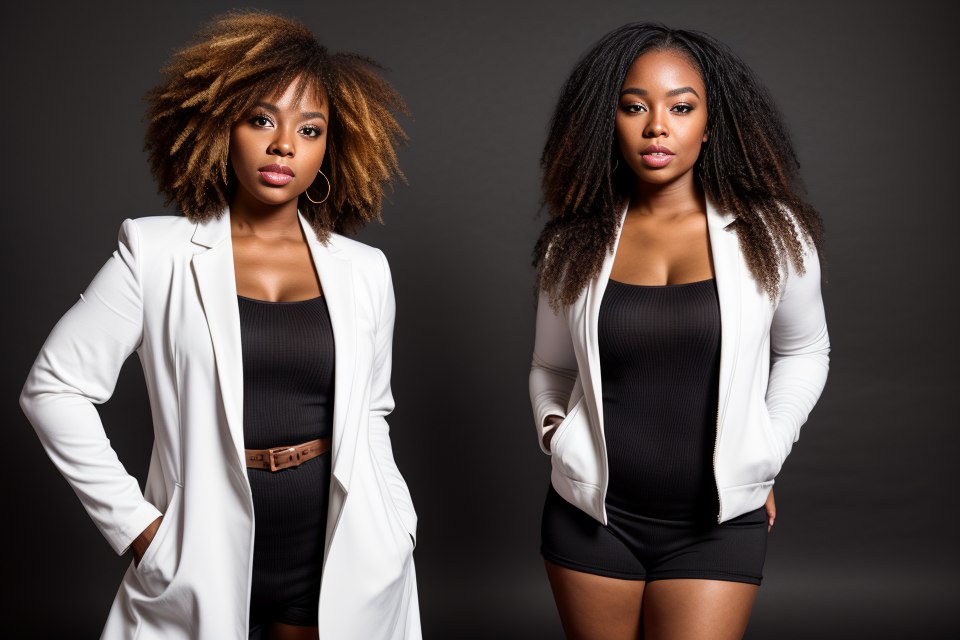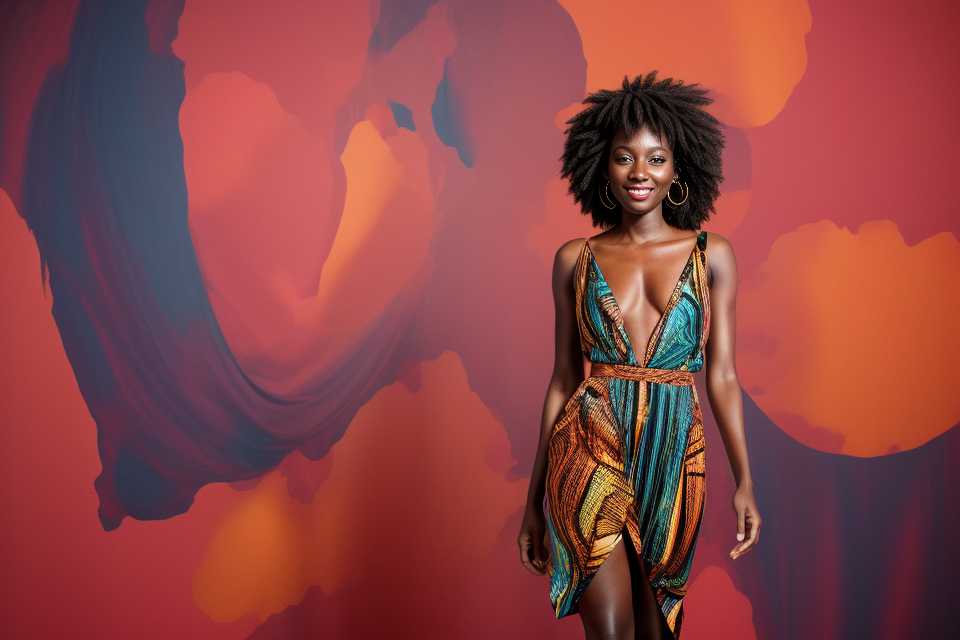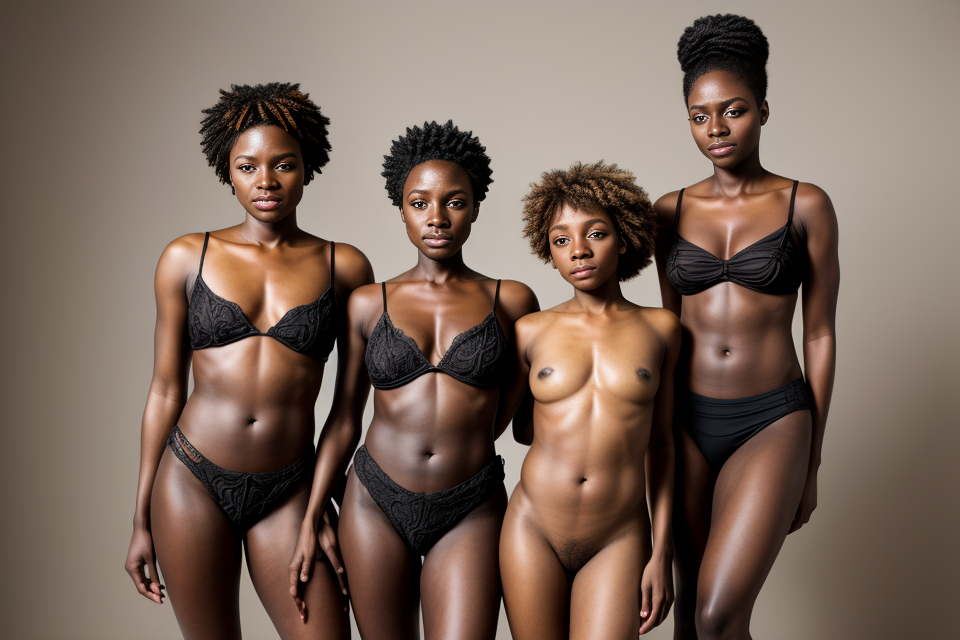The question of what skin tone should avoid wearing black is a complex one, as the answer can vary depending on individual factors such as undertone, skin type, and personal preference. However, it is generally accepted that those with very fair or very dark skin tones may want to exercise caution when wearing black, as it can wash out or overwhelm their complexion.
Fair skin tones:
Individuals with fair skin tones, particularly those with cool undertones, may find that black clothing makes them appear even paler and washed out. This is because black absorbs light and can create a harsh contrast with the skin, making it appear more translucent and less vibrant. Instead, those with fair skin tones may want to opt for lighter colors that will complement their natural hue and enhance their complexion.
Dark skin tones:
On the other hand, those with dark skin tones may find that black clothing can make them appear even darker and can be overwhelming on the skin. This is particularly true for those with deep, warm undertones, as black can create a harsh contrast with their natural hue and make the skin appear flatter and less luminous. Instead, those with dark skin tones may want to opt for lighter, cooler colors that will complement their natural hue and enhance their complexion.
In conclusion, the answer to the question of what skin tone should avoid wearing black is not a simple one, as it depends on individual factors such as undertone, skin type, and personal preference. However, in general, those with very fair or very dark skin tones may want to exercise caution when wearing black, as it can wash out or overwhelm their complexion. Instead, they may want to opt for lighter, cooler colors that will complement their natural hue and enhance their complexion.
It is generally recommended to avoid wearing black if you have a very fair or very dark skin tone. This is because black can make your skin look washed out or unevenly colored. If you have a fair skin tone, black can also make you look pale and sickly. On the other hand, if you have a dark skin tone, black can make you look even darker and can be overwhelming. Instead, it is best to choose colors that complement your skin tone. For fair skin tones, lighter colors such as pink, pastel blue, and beige are good choices. For darker skin tones, warmer colors such as gold, orange, and red can look great.
What is Black Skin Tone?
Characteristics of Black Skin Tone
- Dark brown or black hue:
Black skin tone is characterized by a dark brown or black hue, which is a result of high levels of melanin in the skin. Melanin is a pigment that gives color to the skin, hair, and eyes, and is produced by cells called melanocytes. The amount of melanin in the skin determines the skin’s color, with more melanin resulting in a darker tone. - No blue or green undertones:
Unlike other skin tones, black skin tone does not have any blue or green undertones. This means that black skin appears solid in color, without any hints of blue or green. The absence of blue or green undertones is what gives black skin its distinct, deep color. - High levels of melanin:
Black skin tone is characterized by high levels of melanin in the skin. Melanin acts as a natural sunscreen, protecting the skin from the harmful effects of UV rays. People with black skin tone tend to have fewer wrinkles and age spots than those with lighter skin tones, as the high levels of melanin help to prevent damage from the sun. Additionally, melanin also helps to regulate body temperature, keeping the body warm in cold environments.
Types of Black Skin Tones
Deep Black
Deep black skin tone is characterized by a dark, rich color that is typically deeper than other black skin tones. This skin tone has a deep, rich brownish-black color with a slight reddish or bluish undertone. It is often found in people of African descent, and can look very elegant and sophisticated when dressed appropriately.
Rich Black
Rich black skin tone is similar to deep black, but with a slightly lighter brownish-black color. This skin tone has a warm undertone, and is often found in people of African descent as well. It can be difficult to find clothing that flatters this skin tone, but with the right knowledge and understanding of color theory, it is possible to find flattering outfits that will make this skin tone look its best.
Soft Black
Soft black skin tone is characterized by a very light brownish-black color, with a slight grayish undertone. This skin tone is often found in people of African descent, and can be difficult to match with clothing. It is important to avoid wearing bright or bold colors, as they can overwhelm this delicate skin tone. Instead, opt for soft, muted colors that will complement the skin’s natural coloring.
Can Black Look Bad on Any Skin Tone?
Factors Affecting the Appearance of Black Clothing
The appearance of black clothing can be affected by several factors, including undertones, lighting, and fabric. Understanding these factors can help individuals determine whether black clothing is a suitable choice for their skin tone.
Undertones
Undertones refer to the color of one’s skin beneath the surface. For example, individuals with cool undertones have veins, lips, and gums that appear blue or purple, while those with warm undertones have veins, lips, and gums that appear more reddish or pinkish.
Black clothing can appear different on individuals with different undertones. For example, black clothing may look flattering on individuals with warm undertones, but it may wash out individuals with cool undertones. Therefore, it is important to consider one’s undertone when deciding whether to wear black clothing.
Lighting
Lighting can also affect the appearance of black clothing. In bright lighting, black clothing may appear harsh and flat, while in dim lighting, it may appear more vibrant and rich.
Therefore, it is important to consider the lighting conditions when deciding whether to wear black clothing. If one is unsure about how black clothing will look in a particular lighting condition, it may be helpful to try on the clothing in different lighting conditions before making a final decision.
Fabric
The fabric of black clothing can also affect its appearance. For example, black clothing made from matte or dull fabrics may appear more subdued and sophisticated, while black clothing made from shiny or glossy fabrics may appear more dramatic and attention-grabbing.
Therefore, it is important to consider the fabric of black clothing when deciding whether to wear it. If one is unsure about how black clothing will look in a particular fabric, it may be helpful to try on the clothing in different fabrics before making a final decision.
When Black May Not Look Good
- Yellow or olive undertones
- People with yellow or olive undertones may find that black clothing makes their skin appear more sallow or muddy. This is because the black color can exacerbate the yellow or olive tones in the skin, creating an unflattering effect.
- To avoid this, people with yellow or olive undertones should opt for colors that complement their skin tone instead of black. For example, they could try navy blue, charcoal gray, or deep red instead.
- Poor lighting
- Poor lighting can make black clothing look unflattering on any skin tone. This is because harsh lighting can create unflattering shadows and highlights, making the skin appear dull or washed out.
- To avoid this, it’s important to consider the lighting conditions when choosing what to wear. If you know you’ll be in a poorly lit room or outside in harsh sunlight, it may be best to opt for a different color that won’t be affected as much by the lighting conditions.
- Shiny or cheap fabrics
- Shiny or cheap fabrics can make black clothing look cheap or unprofessional. This is because the shiny or cheap texture can create an unflattering reflection or highlight on the skin, making it appear dull or unhealthy.
- To avoid this, it’s important to choose high-quality fabrics that won’t reflect light poorly or look cheap. Materials like silk, wool, or cashmere are good options for black clothing, as they are soft, high-quality, and won’t reflect light poorly.
How to Choose the Right Color for Your Skin Tone
When it comes to choosing the right color for your skin tone, there are a few things to keep in mind. First, it’s important to look for colors that complement your undertones. This means considering the underlying color of your skin, which can be cool, warm, or neutral. For example, if you have cool undertones, you may want to avoid wearing colors that are too warm, such as yellow or orange. On the other hand, if you have warm undertones, you may want to avoid wearing colors that are too cool, such as blue or purple.
Another factor to consider when choosing colors is the type of fabric you’ll be wearing. Different fabrics can make colors look different, so it’s important to choose fabrics that flatter your skin. For example, if you have dry skin, you may want to avoid wearing fabrics that can make your skin look dull, such as synthetic materials. Instead, opt for natural fabrics like cotton or silk, which can help to enhance your skin’s natural glow.
Finally, it’s important to experiment with different shades of black. While classic black is a staple for many wardrobes, there are a variety of shades to choose from, each with its own unique properties. For example, charcoal gray is a great alternative to classic black, as it can be more flattering for those with warm undertones. Similarly, navy blue can be a good choice for those with cool undertones, as it can add a pop of color to your outfit without being too bold.
By taking these factors into account, you can ensure that you’re choosing colors and fabrics that flatter your skin tone and help you look your best.
How to Wear Black as a Statement Piece for Dark Skin Tones
Dark Skin Tones and Black Clothing
Wearing black as a statement piece for dark skin tones can be a bold and stylish choice. Here are some reasons why dark skin tones can make black clothing look even more striking:
- Enhances natural beauty: Dark skin tones have a rich, deep color that can make black clothing appear even more striking. The contrast between the two colors can create a stunning visual effect, making the wearer look even more beautiful and confident.
- Makes a bold statement: Dark skin tones can make black clothing look even more bold and powerful. This can be a great choice for those who want to make a statement and stand out in a crowd. Whether it’s a little black dress or a pair of black pants, black clothing can be a powerful choice for those with dark skin tones.
Accessorizing with Black
When it comes to accessorizing with black, the key is to choose contrasting accessories that will complement your skin tone without overwhelming it. Here are some tips to keep in mind:
- Choose contrasting accessories: Black can be a very strong color, so it’s important to balance it out with other colors. For example, if you’re wearing a black dress, you could wear bright red heels or a green clutch to add some contrast.
- Add texture with scarves or hats: Accessorizing with scarves or hats can add texture and interest to an outfit. You could try wearing a black hat with a black dress to add some edge, or a black scarf with a black blazer to add some warmth.
- Mix and match with other colors: Black can be mixed and matched with a variety of other colors, so don’t be afraid to experiment. For example, you could wear a black and white striped shirt with a bright pink skirt, or a black dress with a yellow belt.
Black for Special Occasions
When it comes to special occasions, black is the perfect color to make a statement. It’s perfect for formal events and can create a dramatic look that will leave a lasting impression. Whether you’re attending a gala, a cocktail party, or a wedding, black is a versatile color that can be dressed up or down depending on the occasion.
Here are some ways to experiment with different styles when wearing black for special occasions:
- Go classic with a little black dress: A little black dress is a wardrobe staple that can never go out of style. Pair it with statement jewelry and high heels for a chic and sophisticated look.
- Make a statement with a bold neckline: For a more daring look, try a dress or top with a bold neckline, such as a plunging V-neck or a statement collar. This will draw attention to your décolletage and create a dramatic silhouette.
- Add texture and pattern: To add interest to your outfit, try pairing a black dress or top with a textured skirt or pants. You can also add pattern to your look with a printed scarf or statement clutch.
- Play with color: Black is a versatile color that can be paired with any color. For a pop of color, try adding a bright statement piece, such as a red lip or a yellow clutch, to your outfit.
Remember, when wearing black for special occasions, it’s important to feel confident and comfortable in your outfit. Choose pieces that flatter your body shape and make you feel like a million bucks. With the right accessories and styling, black can be a powerful statement color that will leave a lasting impression.
FAQs
1. What is the best skin tone for wearing black?
Answer: Black can be flattering on a wide range of skin tones, but it tends to look particularly good on those with cool or neutral undertones. If you have warm undertones, you may find that black can wash you out and make you look pale.
2. Can people with dark skin tones wear black?
Answer: Absolutely! People with dark skin tones can absolutely wear black and can often pull it off very well. In fact, black can be a very elegant and sophisticated color on darker skin tones.
3. Is it okay to wear black if you have yellow undertones?
Answer: If you have yellow undertones, you may find that black can make your skin look dull or flat. In this case, you may want to opt for lighter colors that will help to brighten your complexion, such as pastels or light neutrals.
4. Can people with olive skin tones wear black?
Answer: Yes, people with olive skin tones can definitely wear black. In fact, black can be a very flattering color on olive skin tones, as it can help to create contrast and add depth to your complexion.
5. Is it better to avoid wearing black if you have fair skin?
Answer: If you have fair skin, you may want to be careful when wearing black, as it can sometimes make you look washed out or drained of color. Instead, you may want to opt for lighter colors that will help to brighten your complexion, such as pastels or light neutrals.



